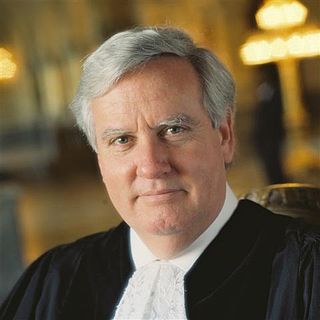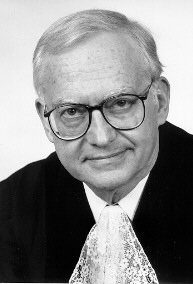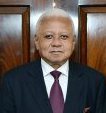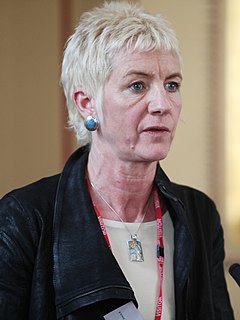Related Research Articles

The Permanent Court of Arbitration (PCA) is an intergovernmental organization located in The Hague, Netherlands. It is not a court in the traditional sense, but provides services of arbitral tribunal to resolve disputes that arise out of international agreements between member states, international organizations or private parties. The cases span a range of legal issues involving territorial and maritime boundaries, sovereignty, human rights, international investment, and international and regional trade. The PCA is constituted through two separate multilateral conventions with a combined membership of 122 states. The organization is not a United Nations agency, but the PCA is an official United Nations Observer.

Louise Bernice Arbour, is a Canadian lawyer, prosecutor and jurist.

Sir Christopher John Greenwood is Master of Magdalene College, Cambridge and a former British judge at the International Court of Justice. Prior to his election, he was professor of international law at the London School of Economics and a barrister who regularly appeared as counsel before the International Court of Justice, the European Court of Human Rights, the English courts, and other tribunals.

Stephen Myron Schwebel, is an American jurist and international judge, counsel and arbitrator. He previously served as Judge of the World Bank Administrative Tribunal (2010-2017), as a member of the U.S. National Group at the Permanent Court of Arbitration, as President of the International Monetary Fund Administrative Tribunal (1993–2010), as President of the International Court of Justice (1997–2000), as Vice President of the International Court of Justice (1994–1997), and as Judge of the International Court of Justice (1981–2000). Prior to his tenure on the ICJ, Judge Schwebel served as Deputy Legal Adviser to the U.S. Department of State (1974–1981) and as Assistant Legal Adviser to the U.S. Department of State (1961–1967). He also served as a professor of law at Harvard Law School (1959–1961) and Johns Hopkins University (1967–1981). Judge Schwebel is noted for his expansive opinions in momentous cases such as Legality of the Threat or Use of Nuclear Weapons, Military and Paramilitary Activities in and Against Nicaragua and Oil Platforms .
Vettath Balakrishna Eradi was a Judge of Supreme Court of India. He also served as the Chief Justice of the Kerala High Court and as President of the National Consumer Disputes Redressal Commission (NCDRC) and the Chairman of Ravi & Beas Waters Disputes Tribunal. Eradi was also noted for his role in several spiritual, cultural, and social organizations.

Prince Zeid Ra'ad Zeid Al Hussein is a Jordanian diplomat who is the Perry World House Professor of the Practice of Law and Human Rights at the University of Pennsylvania. He is also the president and CEO of the International Peace Institute. He also served as United Nations High Commissioner for Human Rights from 2014 to 2018. He played a central role in the establishment of the International Criminal Court, and was elected the first president of the Assembly of State Parties of the International Criminal Court in September 2002. He also served as a political affairs officer in UNPROFOR in the former Yugoslavia from 1994 to 1996.

The Special Tribunal for Lebanon (STL), also referred to as the Lebanon Tribunal or the Hariri Tribunal, is a tribunal of international character applying Lebanese criminal law to carry out the investigation and prosecution of those responsible for 14 February 2005 assassination of Rafic Hariri, the former Lebanese prime minister, and the deaths of 21 others, as well as those responsible for connected attacks.
James Richard Crawford, AC, SC, FBA was an Australian academic and practitioner in the field of public international law. He was elected as Judge of the International Court of Justice for a full term of 9 years in November 2014 and took his seat on the court in February 2015. From 1990 to 1992 Crawford was Dean of the Sydney Law School where he was also the Challis Professor of International Law from 1986 to 1992. From 1992 to 2014, he was Whewell Professor of International Law at the University of Cambridge and Fellow in Law at Jesus College, Cambridge. He was formerly Director of the Lauterpacht Centre for International Law, also at Cambridge.

Sundaresh Menon is a Singaporean lawyer and jurist, currently serving as the Chief Justice of Singapore appointed by former President of Singapore, Tony Tan. He served as the Attorney-General between 2010 and 2012, and Judge of Appeal in 2012.
Mark Philip Painter, served from 1995–2009 as a judge of the Ohio 1st District Court of Appeals in Hamilton County (Cincinnati), after 13 years on the Hamilton County Municipal Court. In March 2009, Painter became the first American to be elected by the United Nations General Assembly to the United Nations Appeals Tribunal. In 2012, Painter resigned from the Appeals Tribunal and joined the Cincinnati law firm Manley Burke as Of counsel.
Sir Peter Leslie Gibson, is a former British barrister and Lord Justice of Appeal of the Court of Appeal of England and Wales, and is currently a judge of the Qatar International Court. Gibson has also served, between April 2006 and December 2010, as the UK's Intelligence Services Commissioner, and was appointed by David Cameron in July 2010 to lead the Detainee Inquiry. He is an honorary member of the Society of Legal Scholars.
The United Nations Dispute Tribunal (UNDT) is the court of first instance in the internal justice system of the United Nations. It became operational on 1 July 2009. The UNDT "hears and decides cases" filed by current and former staff members "appealing administrative decisions alleged to be in non-compliance with their terms of appointment or contract of employment". The staff members as well as the Administration have a "right to appeal the judgments of the UNDT to the United Nations Appeals Tribunal (UNAT)". In order to ensure the independence of this organ, it is composed not of officials of the Organization, but by judges appointed by the Member States of the United Nations through the General Assembly, from which UNDT derives its mandate.
Sir Burton P. C. Hall, KSS, KHS is a Judge of the UN International Residual Mechanism for Criminal Tribunals. He is the presiding judge in the case of the Prosecutor v. Jovica Stanišić and Franko Simatović. He previously served as a Judge of the International Criminal Tribunal for the Former Yugoslavia, a position he was elected to in August, 2009. Hall served as a Justice of the Supreme Court of the Bahamas on 1 February 1991 and then as a Justice of Court of Appeal of The Bahamas from April 1997. On 5 September 2001 he was confirmed as Chief Justice of the Supreme Court of the Bahamas, a position he occupied until 2009.

Rajah & Tann Singapore LLP is a law firm headquartered in Singapore, with affiliate offices in Cambodia, China, Indonesia, Laos, Malaysia, Myanmar, Philippines, Thailand and Vietnam. Founded in 1976, it is a member firm of Rajah & Tann Asia, a network of law firms in Southeast Asia with over 800 fee earners.
Sir Michael John Burton, styled Mr Justice Burton, is a former judge in the High Court of England and Wales. He was the President of the Investigatory Powers Tribunal between October 2013 and September 2018, having been Vice-President since its inception in 2000, the Chair of the Central Arbitration Committee for over 17 years and the former President of the Employment Appeal Tribunal (2002–2005), which was reformed under his presidency.

Mohamed Chande Othman is a Tanzanian lawyer and a former Chief Justice of Tanzania.

Madeleine Selina Rees, OBE is a British lawyer and current Secretary General of the Women's International League for Peace and Freedom. She has spoken out against human rights abuses in Bosnia by peacekeepers and others working for the United Nations.

Danladi Umar is a Nigerian jurist from Bauchi State in northeastern Nigeria. Prior to becoming Chairman of the Code Of Conduct Tribunal (CCT) of Nigeria, he was a lawyer and a Chief Magistrate in Bauchi State, Nigeria. Appointed at age 36 to the CCT as acting chairman, Danladi Umar went on to become the youngest chairman of the CCT four years later.
Mary Faherty is an Irish judge who has been a Judge of the Court of Appeal since November 2019.
References
- 1 2 "General Assembly Appoints 12 Judges to United Nations Dispute Tribunals in Key Step to Improve Organization's Internal Justice System". un.org. 2 March 2009. Retrieved 2014-05-27.
- 1 2 Debo Nwauzu (12 November 2012). "Black Letter Law 2012" (PDF). Retrieved 2014-07-01.
- ↑ "LSE professor awarded knighthood - 2009 - News archive - News - News and media - Home". lse.ac.uk. Retrieved 2014-07-01.
- ↑ "UN Dispute Tribunal". un.org. Retrieved 2014-07-01.
- 1 2 "Legal news: retirement | The Times". thetimes.co.uk. Retrieved 2014-07-01.
- ↑ "Goolam Meeran | Black Letter Law Publication". blackletterlawpublication.com. Retrieved 2014-05-27.
- ↑ "UN Dispute Tribunal". un.org. Retrieved 2014-05-27.
- ↑ "New Year Honours list - Telegraph". telegraph.co.uk. Retrieved 2014-05-27.
- ↑ "New Year honours list: Knights Bachelor, Order of the Bath, Royal Victorian Order, Royal Victorian Medal and Order of Companions of Honour | UK news | theguardian.com". theguardian.com. Retrieved 2014-07-01.
- ↑ "Outcome of the Elections of Judges to the United Nations Dispute Tribunal". mofaic.gov.bw. Retrieved 2014-07-01.
- ↑ "Kuttan Menon Memorial Lecture | tooks chambers". staging.tooks.co.uk. Retrieved 2014-07-01.